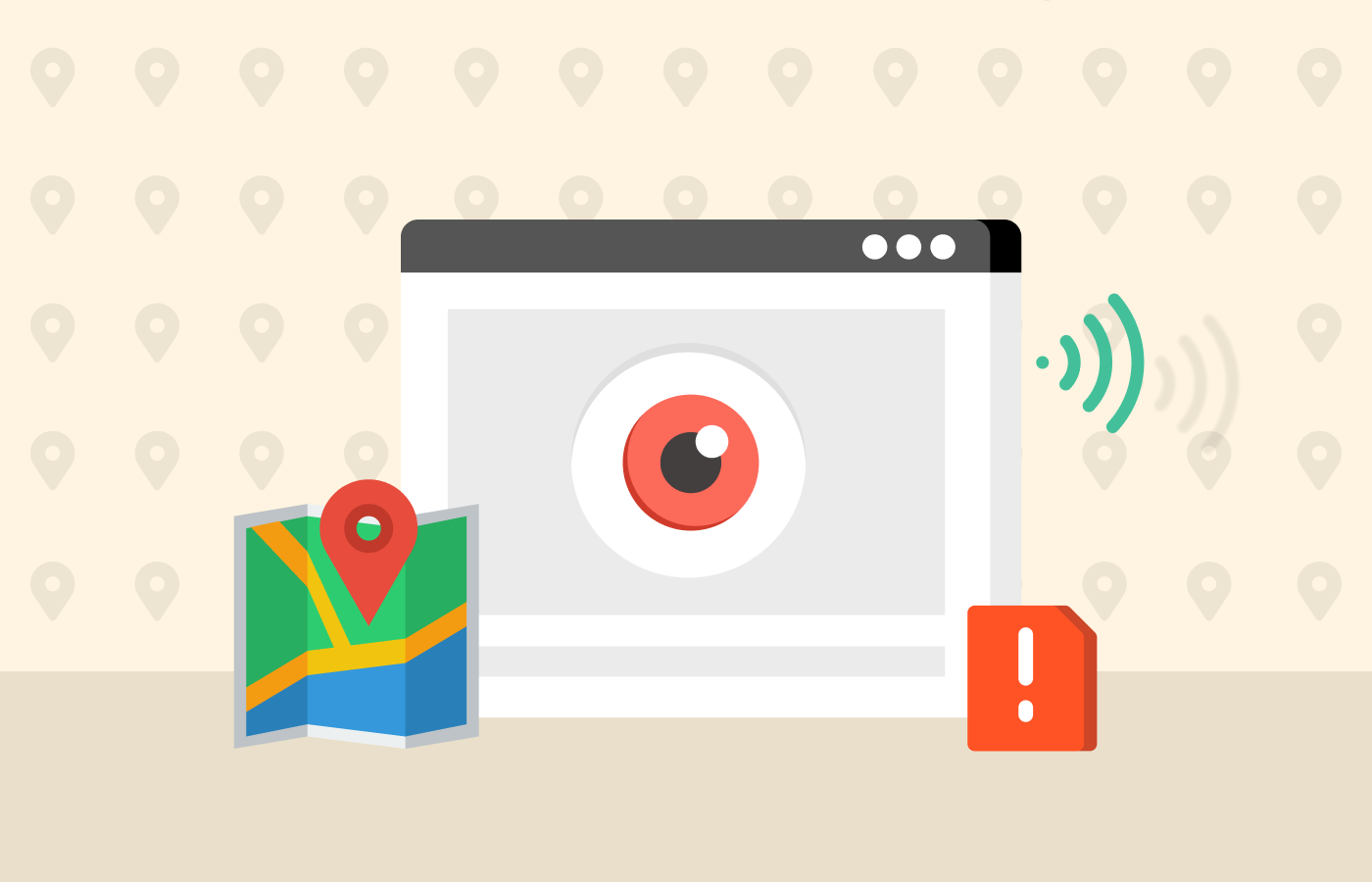
IP addresses are numerical identifiers assigned to a device or router. By using it, you can direct internet traffic to the right place. Your postal address is equivalent to an IP address by which the postal department can deliver letters to the recipient.
Most users only know about IP addresses, but few are aware of public or private IP addresses. Both IP addresses help users to connect to the internet.
This article will discuss the minor and major differences between the two by comparing the public vs private IP addresses. Also, we will explain how you can protect yourself and your IP address from possible online threats.
Public IP address vs. Private IP address overview
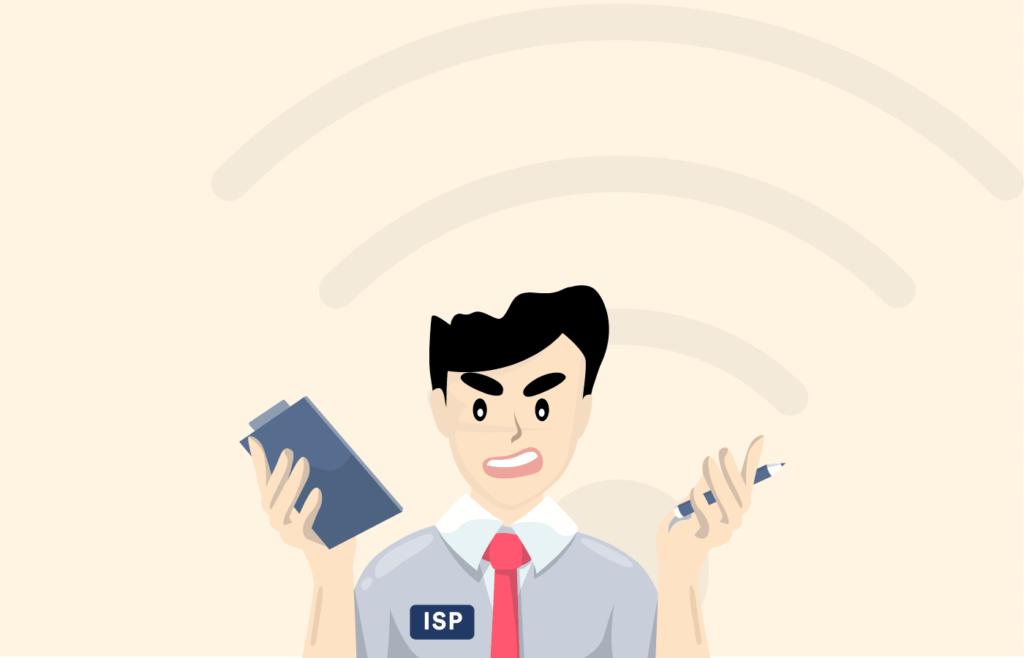
A public IP address is a unique code your ISP (Internet Service Provider) gives your device. Thanks to this code, your devices may connect through the internet. A public IP address makes peer-to-peer communication, server setup, and website hosting possible.
On the other hand, a private IP address is designed for internal use. It helps your devices to communicate with each other within the local network. Your router assigns this IP address to devices within a local network, such as your computer or smart TV. Private IP addresses adhere to specific address ranges defined by IANA (Internet Access Numbers Authority).
Below is a breakdown of the major differences between public IP addresses and private IP addresses.
| Category | Public IP Address | Private IP Address |
|---|---|---|
| Price | This isn’t free. The price of a public IP address depends on the type of IP address and your ISP. | This is free of charge |
| Range | Class A – 1.0.0.0 to 127.0.0.0 Class B – 128.0.0.0 to 191.255.0.0 Class C – 192.0.0.0 to 223.255.255.0 | Class A – 10.0.0.0 to 10.255.255.255 Class B – 172.16.0.0 to 172.31.255.255 Class C – 192.168.0.0 to 192.168.255.2 |
| How to View | You can view your public IP address by searching for “What is my IP address” on Google | You can check system preferences or settings |
| Uniqueness | The code is completely unique for each device | The code isn’t unique; different routers are using it |
| Utility | It is used to communicate with different devices over the global internet | It is used to communicate with devices within a local network |
| Traceability | This address can be traced by your ISP, the government, hackers, and advertisers | Private IP addresses can be traced by other devices within the local network |
What is a public IP address?
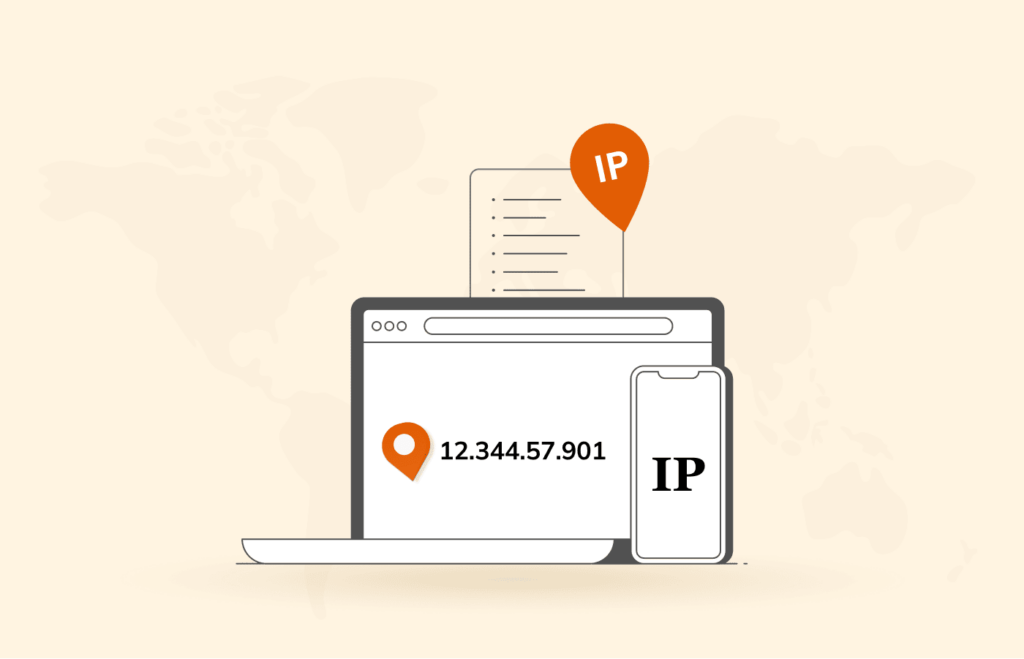
A public IP address, an external address, is a unique address given to your router by your ISP. With the help of your public IP address, sending and receiving messages is easy. Also, you can’t access the internet if you don’t have a public IP address.
Imagine your device to be your house and your public IP address as your home address that helps people find you. This special address ensures that data gets across to you easily.
What is an external IP address?
An external IP address serves as a means by which your device can communicate with other devices outside the local network. It also helps you communicate with other public IP addresses.
When your device is connected to the internet, your ISP assigns an external IP address. The assigned IP address is unique to your device at that moment. Usually, your external IP address may change as you connect and disconnect from the internet. This is because the IP you were given is dynamic.
What is my public IP address?
Finding the IP address your ISP assigned to your device is quite easy. All you have to do is go to Google and search “What is my IP address?” or use an online IP checker tool for a more detailed look. The address you see after you search is your IP address.
The government, hackers, or your ISP can trace your online activity to your IP address. This makes it easy for you to be a victim of possible threats. You can avoid possible threats on your IP by using a VPN. It uses advanced security features to protect your IP while browsing from your ISP and hackers.
Whenever your device wants to interact with the internet, a new IP is given by your ISP. This is because distributing a static IP would’ve been expensive, and with the small number of IPv4 addresses available, not all devices would have an IP.
Why should I hide my public IP address?
You may wonder if hiding your public IP address while using the internet is important. Ironically, while revealing a public IP address is essential for your online existence, hiding your IP address is equally crucial. Aside from your public IP address helping you interact with other devices online, it lets others trace your online activity to your IP.
With this in mind, should you hide your IP address? The answer is yes.
There are different ways to hide your IP address while using the internet. You can use a VPN, proxy server, or a private browser like Tor. We’ll advise using a VPN to hide your public IP address. A virtual private network secures your online activity through advanced security encryption. It also provides you with a fast connection for browsing.
What is a private IP address?
A private IP address is one that your router gives to your device. This address is usually used for local networks in offices, residential areas, and enterprises.
What is an internal IP Address?
An internal IP address is mostly used for devices interacting within your local area networks. This IP address can only seen by computers within your local network. Any computer connected to an external network can’t see your internal IP address. An internal IP address is also called a private IP address.
One outstanding benefit of an internal IP address is that different computers can use the same IP address. Internal IP addresses usually start with 192.168.1.1.x.x.
Why are private IP addresses needed?
Private IP addresses make it easy for devices like printers and file servers to communicate and share resources without needing public-facing IP addresses. With the limited availability of IPv4, private IP addresses are used to conserve the limited pool of public IP addresses available worldwide.
It is said that IPv4 addresses will no longer be in use in the coming days. Instead, devices will make use of IPv6 addresses. Additionally, computers will no longer need NAT (Network Address Translation) to connect to the internet.
What is my private IP address?

Finding your private IP address may not be as easy as searching “what is my IP” on Google, but the process is straightforward. Knowing your private IP address is only necessary when you’re trying to configure your network’s advanced settings or troubleshooting.
To find your private IP address on Windows, all you have to do is:
- Long press the Windows key and the letter “R” to open Run.
- Write “cmd“ in the blank space to open a prompt window.
- In the prompt window, type in the command “ipconfig” and press Enter.
- A list of addresses will come up, including your IPv4 address.
By following the steps below, you can also find the Private IP address of your Windows:
- Click on “Start” and go to “Settings.”
- In the Settings, select “Network and Settings.”
- Click on the tab that says “Properties.”
- Scroll till you see the IPv4 address. The code that comes up is your local IP address.
Follow the steps below to find your Private IP address:
- Select the Apple menu.
- Choose “System preferences.”
- Click on “Network.”
- Select your network connection from the menu on the left.
- Your local IP address will be listed next to the IP Address for Ethernet connections and under Status for Wi-Fi connections.
Can you hide your private IP address?
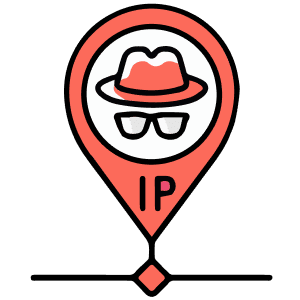
A private IP address isn’t visible to the public because it is used within local networks. It is only seen by devices within the same network. To protect your IP address from third parties, you can hide your IP from other devices within a local network. You must designate your network as Public rather than Home in Windows 10.
You can monitor your public IP address for network traffic and potential security breaches with IDPS (Intrusion Detection and Prevention System). IDPS helps protect your public IP address from malware and hacking.
Apart from designating your IP address as public on Windows, you can also hide your IP address by using a VPN. A Virtual Private Network helps hide your IP address while you’re browsing. It also protects your data from hackers and the government.
Public vs. Private IP address: How are they different?
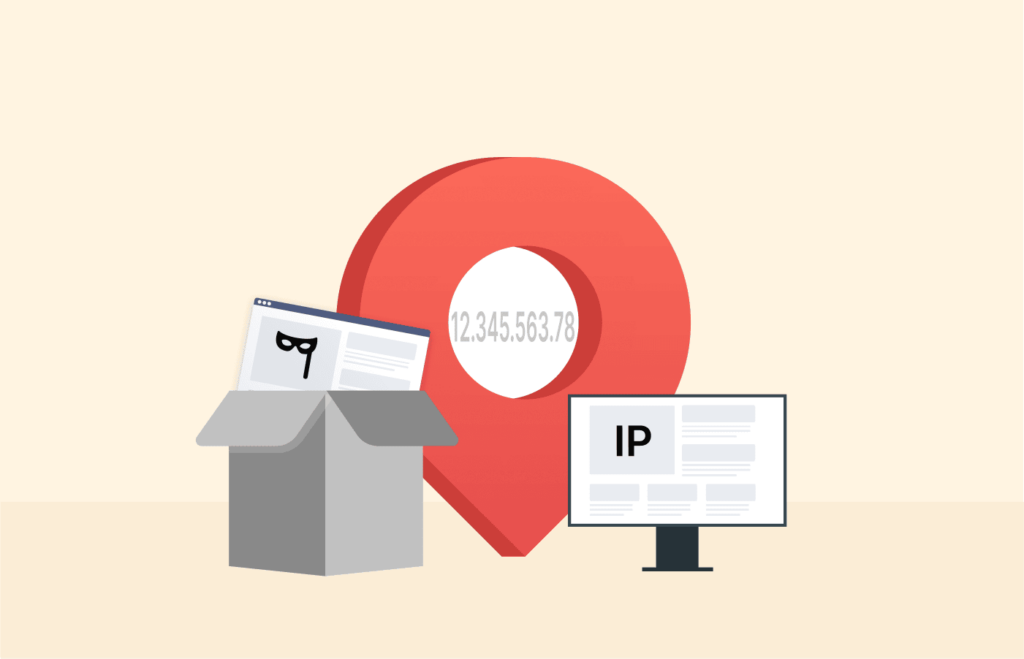
After understanding public and private IP addresses, it is important to know their differences.
Utility
The public and private IP addresses aren’t the same. They are both used differently. Your public IP address helps you interact with other devices on the internet. Meanwhile, your private IP address helps you interact with other devices in your local network.
You can access the internet easily by using a public IP address. This IP address sends you information through your router network. Network Access Translation then sends This information from your router to your device through a private IP address.
A public IP address assigns unique codes to your router network for each connection, but a private IP address assigns the same code to devices in your local network. The most used IP, IPv4, allows only four billion unique addresses. This is less than the number of devices that are connected globally. Therefore, different devices can’t have unique codes. So, to conserve the IPv4 addresses, the same private IP address is shared among all the devices within a local network.
According to reports, IPv6 is set to take over IPv4. This IP consists of a 128-bit alphanumeric string, allowing 340 undecillion connections. This means that there would be enough unique IPs for various devices.
Fixed ranges
Public and private IP addresses are organized within specific numeric ranges. This helps to maintain a systematic and logical framework. The distribution of private IP addresses to various companies around the globe is handled by IANA (Internet Assigned Numbers Authority). Below are some of the IP addresses used by the popular router manufacturers:
| Router manufacturers | Private IP address |
|---|---|
| D-Link/ Netgear | 192.168.0.1 |
| Linksys | 192.168.1.1 |
| Belkin/SMC | 192.168.2.1 |
| Cisco | 192.168.1.254 or 192.168.10.2 or 192.168.1.1 |
Conversely, public IP addresses consist of numeric strings that aren’t assigned to private IDs. Each public IP address is unique and can only be used once. Meanwhile, private IP addresses are often reused across various routers.
Traceability
Websites and servers find you easily through your public IP address. Because of this, your public IP address must always be visible. Once your public IP address is visible, it is easy for your network router to receive information. Because your public IP address always stays visible, it is easy for hackers and third parties to attack your device.
Your private IP address is only visible to devices within your local network. Any other device outside your local network can’t see your private IP address. Hackers can easily access your data once a breach in your local network opens you up to phishing scams.
You can protect your public and private IP addresses using a virtual private network. A VPN helps to change your public IP address when you’re browsing. It also helps hide your private IP from other devices in your local network.
How to use a VPN to keep your IP Address hidden
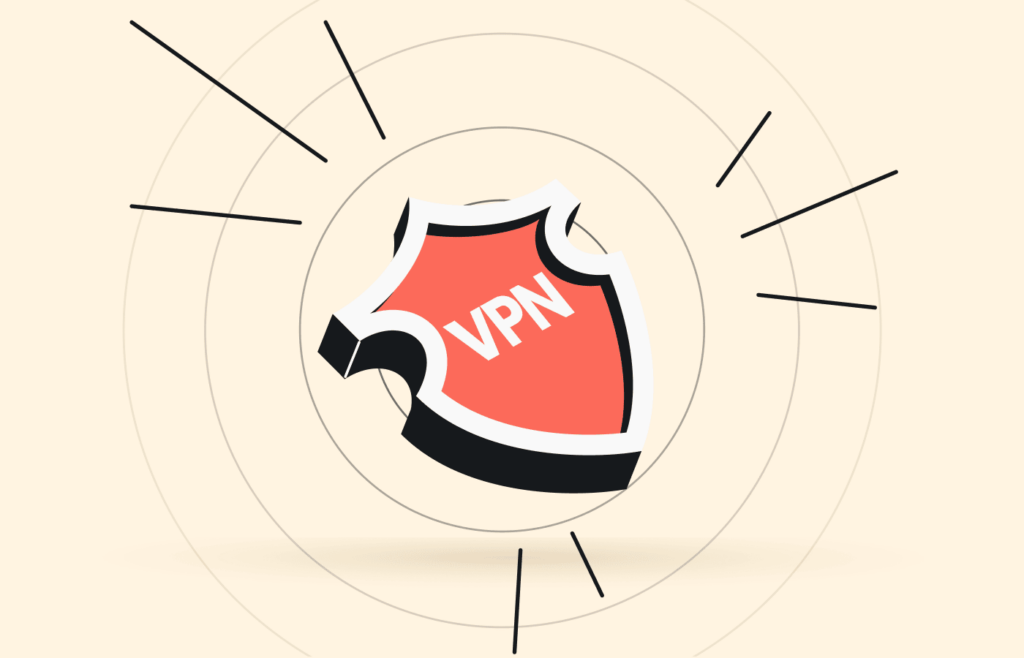
When choosing a VPN to hide your IP address, go for a provider with decades of experience in cybersecurity. These VPNs are easy to set up or configure on your phone or PC.
Follow the steps below to conceal your IP address with a VPN:
- Choose a reputable VPN service. NordVPN is our top recommendation.
- Download your selected VPN.
- Then, sign in or create an account.
- Choose a server of your choice.
- Proceed to connect to the VPN.
- Verify your IP address using the IP lookup tool.
Our top VPNs – Detailed overview
You can best hide your IP address by using a trusted VPN. However, finding the right VPN can be difficult as various VPNs are available. To help you make the right choice, we selected three VPNs that we consider the best. Read this detailed review to know more.
1. NordVPN

One of the most trusted VPN services that helps you hide your IP address and remain anonymous while surfing online.
Pros
- Offers a 7-day free trial to all new users
- Quick helpful customer support
- Provides consistently fast speed for browsing
Cons
- Mobile app is poorly optimized
NordVPN is one of the few VPNs with a dark web monitor. This cybersecurity feature scans the internet for any credential leaks associated with your account, especially your email address. This VPN provider also has a Threat protection feature. It helps easily block malware, ads, web trackers, and other threats.
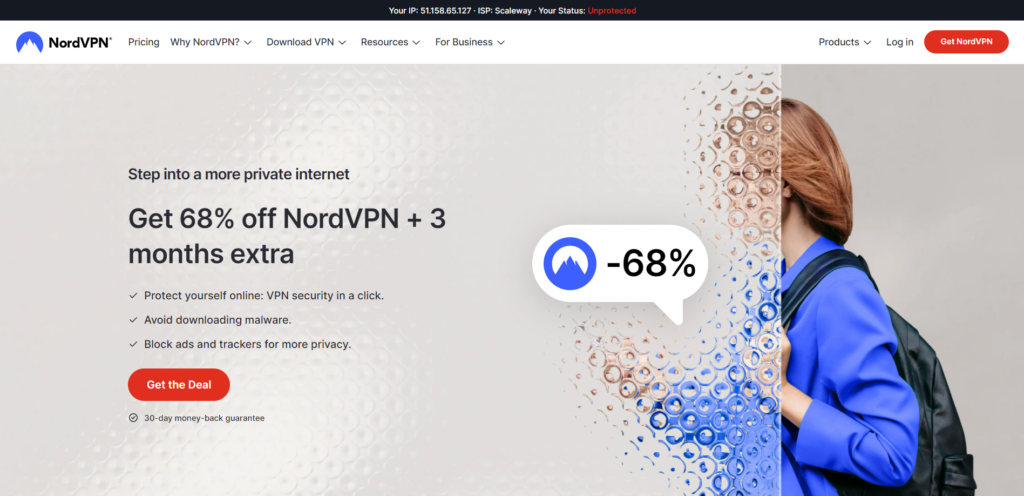
With VPN’s Meshnet feature, you can create your encrypted network. You can also connect multiple devices together anywhere in the globe. Additionally, your data remains safe with this service as it has a no-log policy and AES-256-bit encryption.
2. ExpressVPN

An unprecedented VPN service that has top-notch security and privacy and helps users remain safe. With its super-fast servers and excellent unblocking capabilities, you can unblock and stream your desired content.
Pros
- Allows unlimited torrenting with P2P sharing
- Simple and intuitive user interface
- Top-notch privacy and security features
Cons
- Limited port-forwarding support
Since ExpressVPN’s launch in 2008, it has helped various individuals to take control of their privacy and security. ExpressVPN has advanced features that help keep your data protected while using the internet. It uses AES-256-bit encryption to protect your data, has a no-log policy, and protects your device against DNS and WebRTC leaks.
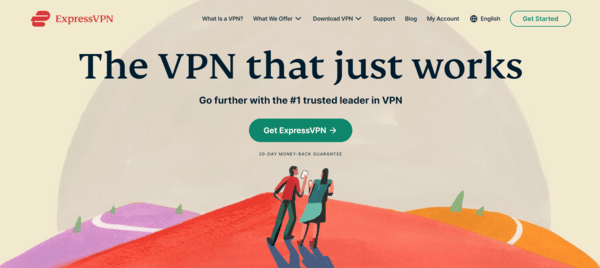
It boasts over 3,000 servers in more than 107 countries. This means you can dodge those annoying geo-blocks with ease. The VPN also boasts a robust kill switch named “Network Lock” that helps protect your information whenever your connection is lost.
Compatibility isn’t an issue for this service; it works with major operating systems. Although ExpressVPN may be a bit pricey, it offers enough features to justify its cost.
3. ExtremeVPN

An over-the-top VPN provider that ensures maximum anonymity via robust encryption and impressive security features.
Pros
- Budget-friendly VPN service
- Easy-to-navigate service
- Offers a stable connection and lightning-fast speed
Cons
- Lacks a dedicated IP address
ExtremeVPN has an attractive pricing plan for users mindful of their budget. Although new, it has some amazing features found in other top VPNs. These include a no-log policy, DNS leak protection, and AES-256-bit encryption. It makes use of obfuscated servers to hide VPN usage from your ISP.
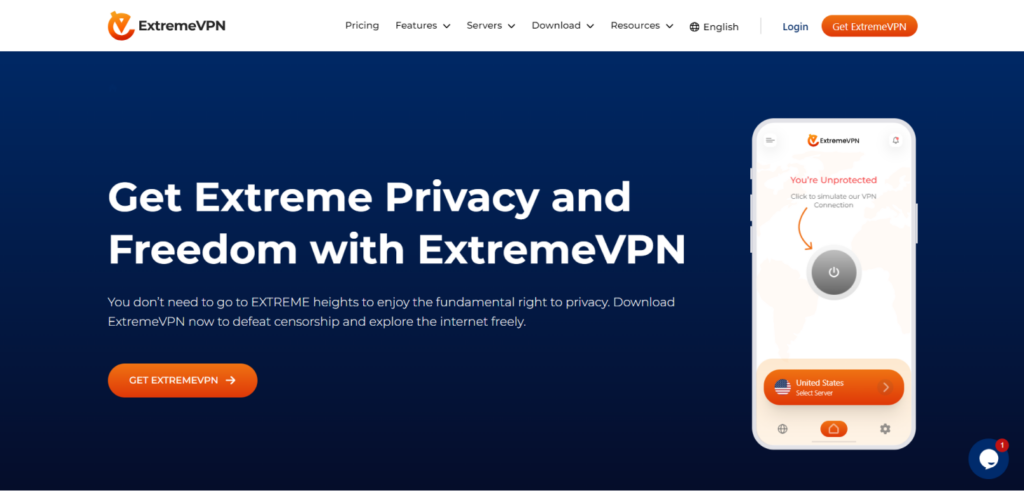
Despite its low cost, it has a large server network spread across over 78+ countries in 88+ countries worldwide. Additionally, this VPN has multi-port capabilities, offering you a premium VPN experience.
FAQs
The number 192.168 is a private IP address. The Internet Access Numbers Authority (IANA) reserves 192.168.0.0 to 192.168.255.255 for private IP addresses.
A private IP address is changed to a public IP address through the Network Access Translation process. This process ensures that your traffic is sent over the internet.
